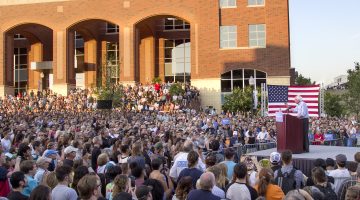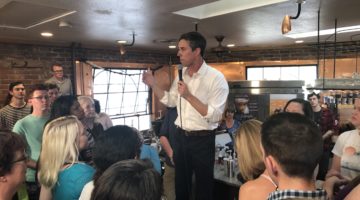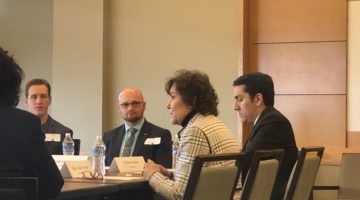While political ads constantly bombard us with nasty attacks on TV and everything we post on social media is at risk of turning into a hostile debate, it’s clear to see there is a deep rift between opinions in America. This dissent is nothing new: ad hominem attacks and dichotomy have been parts of American history since its birth more than 200 years ago.
However, within the past 10 years this polarization of viewpoints, especially involving politics, has become extremely disparate. According to the Pew Research Center, the percent of Americans who hold moderate views has shrunk by 10 percent — from 49 percent in 2004 to 39 percent in 2014. This rapid change in political identification means that more Americans are adopting increasingly extreme political opinions, liberals and conservatives alike.
As the common ground between the left and the right quickly falls out beneath our feet, our democracy is growing more stagnant each day and we become further entrenched in political gridlock. At his final State of the Union address, President Obama touched on how this polarization is one of the things he regrets most during his presidency.
“Democracy grinds to a halt without a willingness to compromise,” he says, “or when even basic facts are contested, or when we listen only to those who agree with us. Our public life withers when only the most extreme voices get all the attention.”
These extreme voices, like Donald Trump, rally other extremists to join forces and continue to justify their radical opinions by creating a social identity for themselves. And while spending time with like-minded people may appear beneficial, it does more harm than good. When we categorize ourselves into separate political groups, we feed into an “us vs. them” mindset where we believe our opinion is right and anyone who disagrees is wrong. Yet politics, or the world for that matter, is not that black and white and requires compromise.
But why can’t we Americans just learn to compromise? It turns out learning is half the problem. According to “The Big Sort” by Bill Bishop, higher education actually contributes to the polarization problem in America. Seeking higher education in turn has us seeking evidence to justify our beliefs and disprove others.
If a professor has a different viewpoint than us, we’re unlikely to respect their beliefs and take them seriously, and some might take it as far as posting “DO NOT TAKE 0/10 do not recommend” on RateMyProfessor.com. We become blind to any information that challenges what we believe to be true. On the other hand, professors as well as other students who support our opinions are seen as more intelligent and we flock to these people.
And this polarization is not exclusive to politics. As my fellow nerds know all too well, there is a huge dichotomy between Marvel and DC. The debate between Marvel fans and DC fans becomes so heated, it could fuel a civil war. But why do we treat something as trivial as comic books akin to the apocalypse? Marvel-based puns aside, almost every form of entertainment has been exposed and corrupted with polarity. From The Dress to Meek Mill and Drake or Wiz Khalifa and Kanye West, we divide and pick sides. It’s almost as if we are addicted to the conflict and drama that arises from these situations and neutrality would be equivalent to withdrawing.
So where does that leave us? If polarization is just a side effect of the human condition in America, is there a 12-step program we can check into to rehabilitate both sides of the aisle and find some shared values between both Republican and Democrat, or end the beef between Ye and Wiz?
While it may not come easy, and may take a little bit of settling on some of the more poignant issues, I think it is possible for us to set aside the differences and leave the extreme partisanship in the past. If we augment what we have in common and take into consideration the views of the opposite side, we can depolarize the situation. While my hopes for the future may be a bit optimistic, I’ll leave you with this:
In the end of his final State of the Union, President Obama called the American people to action. In response to the hate that divides us, he asked,“Will we respond to the changes of our time with fear, turning inward as a nation, turning against each other as people? Or will we face the future with confidence in who we are, in what we stand for, in the incredible things that we can do together?”
His words, reminiscent of a speech given by Abraham Lincoln nearly 160 years prior, hold the same message; it is true that “a house divided against itself cannot stand,” and it is vital that we as Americans consider the incredible progress we could achieve if we united as a nation and left the heated Facebook debates in the past.
Jessica Kitchingman studies political science. She can be reached at alexandraschultz@unr.edu and on Twitter @TheSagebrush.












